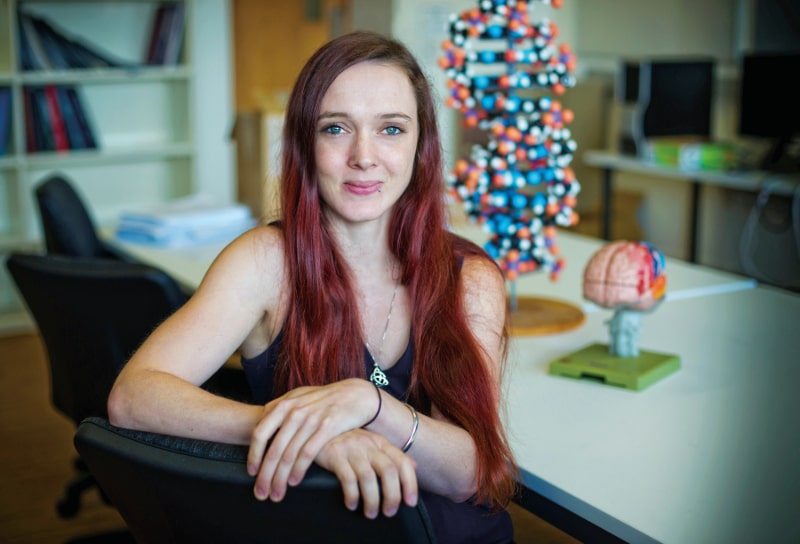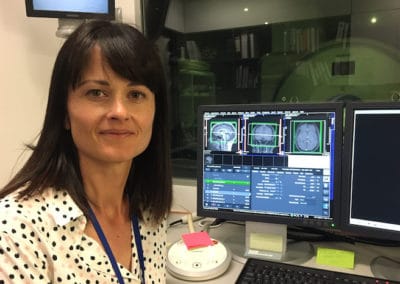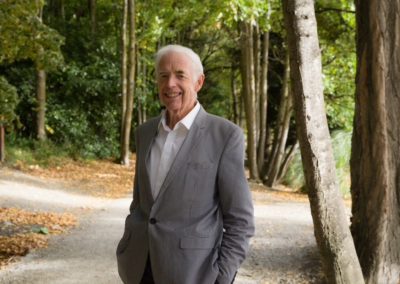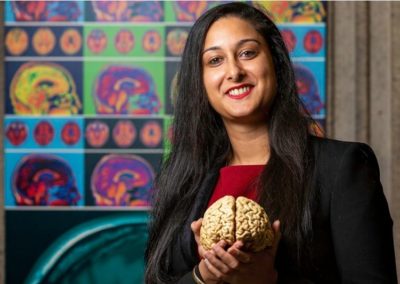Dr Meg Spriggs wasn’t always interested in science. “At school I was very much an arts kid,” she says, “and I dropped science in fifth form.” But during her psychology undergraduate at the University of Otago everything changed. Meg was introduced to EEG (electroencephalography) and fMRI (functional magnetic resonance imaging) – and she was hooked. “I was really drawn in by the idea that we could measure what’s going on in the brain from the outside,” she explains. “With EEG we can measure the cells talking to each other. And that’s the basis of human thought and behaviour!”
After finishing her BA at Otago, Meg joined Prof Ian Kirk’s lab at the University of Auckland for a couple of summer placements and her Honours degree. “I really enjoyed working with Ian”, she says. “He would let me explore things and go a little bit science crazy, but he would also reign me in if I got carried away.” Meg continued to work in his lab during her PhD, which was supervised by Ian, Assoc Prof Lynette Tippett, and Dr Suresh Muthukumaraswamy. She also became part of Brain Research New Zealand as one of the first fully funded PhD students.
For her PhD project, Meg looked at electrophysiological markers of neural plasticity (the brain’s ability to adapt) that differentiate healthy ageing from mild cognitive impairment (a condition that causes cognitive changes and increases the risk of developing dementia). “From animal models we know that in Alzheimer’s, there is a disruption of neuroplasticity in the very early phases of the disease, potentially before you even notice any cognitive changes,” she explains. “I was looking to see if we can identify these changes, hoping that eventually we can use them as biomarkers.”
Meg used two EEG paradigms to index neural plasticity, an auditory and a visual stimulation task, and investigated differences between 3 groups – young adults, older adults and older adults with mild cognitive impairment. The study participants were recruited through the Dementia Prevention Research Clinic (DPRC), allowing Meg to directly work with community members and to “hear some wonderful stories.” Working with the wider DPRC and BRNZ team, she also had the chance to further improve her clinical and imaging skills.
After analysing mountains of data, Meg showed that there are indeed changes in neural plasticity that differentiate healthy ageing from mild cognitive impairment, which suggests that there may be processes going on in mild cognitive impairment that dampen neuroplasticity mechanisms. The tasks that she worked on are now being followed up at the DPRC, with the aim of being turned into biomarkers that may predict the development of dementia in individuals.
While she is excited to follow the progress of the DPRC, for now her own path has taken her elsewhere. Meg currently works as a postdoc in the Centre for Psychedelic Research at Imperial College London. She is investigating psilocybin, the active ingredient in magic mushrooms, and how it can be used in the treatment of mental health. Meg is leading a new trial looking at psilocybin assisted therapy for anorexia nervosa. She is also assisting with another trial looking at the psychological and brain effects of psilocybin in healthy volunteers. She is particularly excited about the opportunity this field offers for a new approach to mental health treatment, she says: “Anorexia is the most fatal of all psychiatric conditions and there are currently no effective treatments. It is also a lot more common than many people realise and affects people of all ages.”
Even though Meg’s research has changed focus, her time at BRNZ and the DPRC set her up well for it: “My PhD taught me skills in managing a project, working with participants, thinking outside the box, and technical skills such as EEG, MRI, and data analysis.” She has also learned to take every opportunity and make the most of it – whether that’s going to conferences, building connections with labs overseas, or moving to London to explore a new passion.
And while she doesn’t quite know yet where her research might take her, she knows that her work will make a difference: “I’m passionate about our future and what research can do for us. I’ve always been passionate about ageing and mental health, things that affect all of us. It’s the research that BRNZ is doing, that my current lab is doing, that people all over the world are doing – this kind of research is going to make a real difference in people’s lives.”



